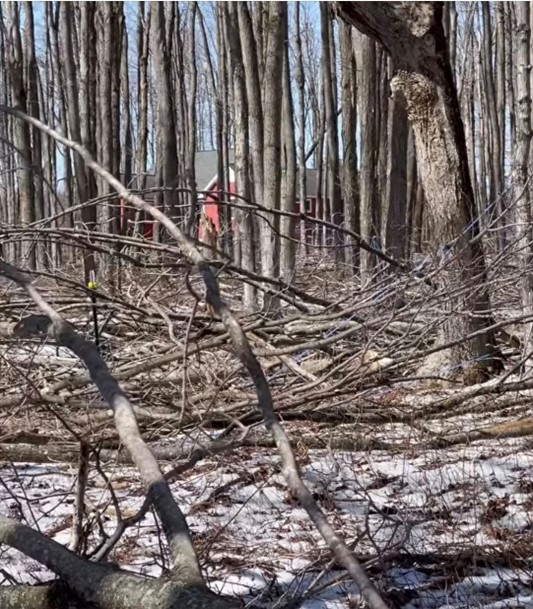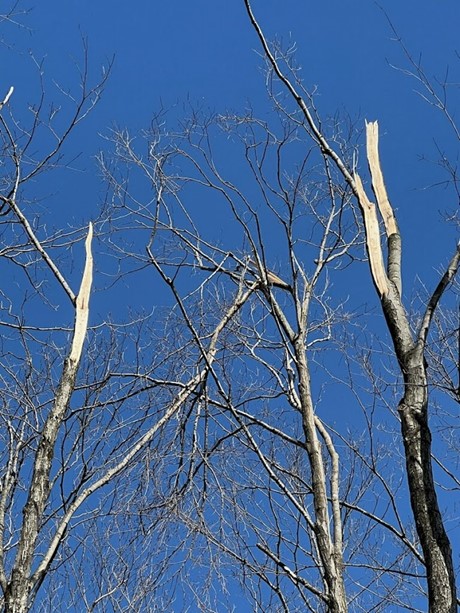Devastating ice storm impacts northern Michigan maple syrup industry
Maple syrup producers in northern Michigan pick up the pieces after “once in a hundred years” ice storm.

A historic ice storm in northern Michigan wreaked havoc on an important specialty crop for Michigan producers. Beginning on March 28, 2025, and continuing for the better part of 2 days, nine counties in the “tip” of northern lower Michigan, and one county in the eastern Upper Peninsula, saw between 2-5 inches of steady rain. With temperatures hovering around the freezing mark, the entire region was blanketed with between a quarter and two inches of ice.

Most area maple syrup producers were in the midst of their seasonal production, actively transporting sap to their “sugar houses,” where water is evaporated and the liquid gold that is pure Michigan maple syrup is born. Under the added weight of that much ice, trees started to snap. One producer likened it to the sound of gunfire, “going off over and over again.”
Now, as maple syrup producers are moving from crisis mode to being able to assess damages, the clear and long-lasting effects of the event have become apparent. Initial industry reports are that Michigan has lost approximately 200,000 taps, resulting in an estimated $3.5 million in bulk syrup sales. While some Michigan maple syrup operations do carry a type of crop insurance, there is much uncertainty in the minds of producers. Like many agricultural business owners, the typical syrup operator is between 60-70 years old. Many of them will be reluctant or unable to reinvest in their businesses and wait 20-40 years for new maple seedlings to grow to the size where they can replace the damaged trees. For those without insurance that covers most of their infrastructure, the monetary loss may be insurmountable. To assist with the recovery, the Michigan Maple Syrup Association has launched a GoFundMe campaign.
As the immediate crisis passes, producers are left grappling with tough decisions about recovery and the future viability of their stands. The initial step of clearing limbs, branches and vacuum tubing can take hundreds of hours, even in modestly sized operations. Safety is always a concern when walking through the woods; now thousands of snagged limbs hang precariously in trees, waiting until a wind, their own weight, or natural decay results in them falling to the ground. Some insurers request operators not remove debris until their adjuster can assess the damage.
Jesse Randall, of Michigan State University’s Forestry Innovation Center located in Escanaba, says many operators are starting to assess the viability of their maple stand as a whole, as well as individual trees. For an individual tree to survive, it should have between 50-65% of its crown, or top branches where the leaves originate, remaining. Randall suggests that, if possible, producers would wait to cut questionable trees until the tree leafs out. Maple producers can get a much better visual idea at that point. Hiring a drone to fly the maple canopy, if possible, will give a bird’s eye view of the top of the tree.

Mike Ross, of R.M.G. Family Sugar Bush in Rudyard, said a recent experience with a less severe ice storm in their sugar bush taught him to not cut trees (except obvious safety hazards) until a year after an ice storm event. Depending on a variety of factors, maple trees can survive, but drastic reductions in sap output may dictate that the sugar bush will not be financially viable. Careful observation and analysis will be required by most syrup producers in the affected areas.
MSU and MSU Extension resources can be of assistance on the road to recovery. For maple-specific questions, Jesse Randall can be contacted at randal35@msu.edu or by calling 906-786-1575. Chris Bardenhagen, a farm business management educator with MSU Extension, helps all types of producers make strategic financial decisions regarding their businesses. He can be reached at bardenh1@msu.edu or by calling 231-256-9888. Finally, Remington Rice, a fifth-generation farmer himself, leads MSU Extension’s Managing Farm Stress program and offers support for dealing with the personal and family toll of agricultural crises. Rice can be contacted at riceremi@msu.edu or at 231-882-0026.



 Print
Print Email
Email


